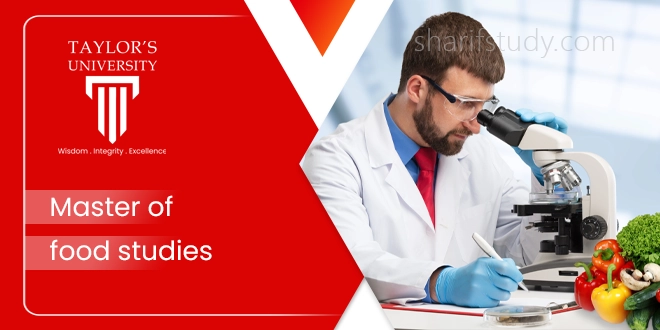During the Taylor’s Master of food studies program, students will have the knowledge and abilities to examine, consider, and actively participate in the current social and cultural concerns related to the changing food systems and food cultures.
This program, with a focus on social sciences, trains practitioners to negotiate the complicated issues of today’s food landscape. Students will get a broad understanding of food cultures, investigating their impact on society and considering methods to intervene and effect positive change.
| School | Food Studies and Gastronomy |
| Study Options | Full time or part time |
| Study Program | 2 to 4-year (full time) or 3 to 6-year (part time) |
| Intakes | February, April, June, September and October |
| Mode of Education | Research |
| Practical Input | From Industry Professionals |
Program Structure
Research Methodology
- Students are required to pass the Research Methodology modules (6 credit hours) in the first year of their candidature.
Key Research Areas
Food Cultures & Health
Consider conflicts between social and medical standards, as well as social interactions, in the construction of individual and community identities, particularly in multi cultures. Influence the customizing of public health messages in Malaysia based on social and cultural and economic and social circumstances. Help to a change in public health policy away from a the population and based on science approach and toward a target-group and social based approach.
Gastronomy, Heritage and Tourism
Analyze the processes of defining food heritages and their connections to communal identity development. Taylors Master of food studies Provides insights that help institutions and non governmental organizations (NGOs) with territorial development and population led initiatives that rely on food history as a socioeconomic, sociocultural, and political resource.
Food Security and Sustainability
Study food security in relation to global environmental and health challenges. They also include food production, processing, distribution, and consumption controversies. Give insights into the possibilities of insect based feeds and meals as a growing industrial sector in Asia.
Food Safety, Fraud & Risk
Analyze the public’s view of food risk, the establishment of collective risk management systems, and the conditions for the development of food policy. Observe food worries and reconsider Asian food protection standards.
Entry Requirements
- A Bachelor Degree (Level 6, MQF) in the field or related fields with a minimum CGPA of 2.75 or its equivalent, as accepted by the Senate; OR
- A Bachelor Degree (Level 6, MQF) in the field or related fields or its equivalent with a minimum CGPA of 2.50 and not meeting a CGPA of 2.75 can be accepted subject to rigorous internal assessment
- A Bachelor Degree (Level 6, MQF) in the field or related fields or its equivalent but not meeting a CGPA of 2.50 can be accepted subject to a minimum of five (5) years working experience in related field.
Career Options
- Consumer Research Departments
- Management positions in food service or food-related enterprises
- Product managers in the food industry and food services
- Applied researchers in private and public entities
- Consultants in food service planning and design
- Business and market analysts for the food industry
- Food, health and nutritional counsellors
- Media, social and cultural analysts
- Advocacy, Communications and Regulatory Affairs
- Academician
Program Fees
| Local Student | MYR 32,700 (Full-Time) MYR 27,632 (Part-Time) |
| International Student | USD 11,833 (Full-Time) |
 SharifStudy Best way to Study in Malaysia
SharifStudy Best way to Study in Malaysia




